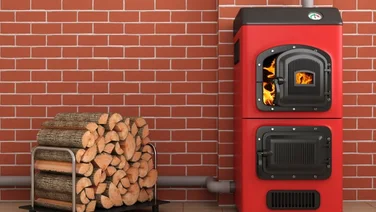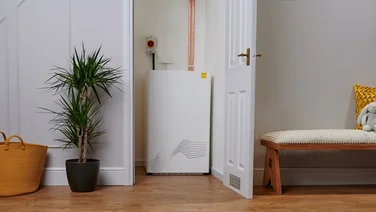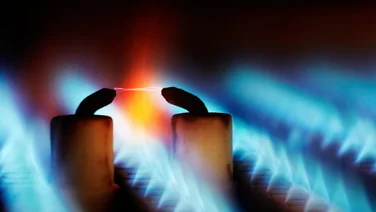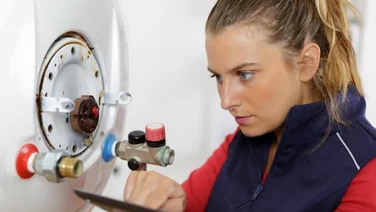We receive a small fee from trusted installers when you request a quote through our site. This helps us keep our content independent, well-researched and up to date – Learn more
✔ When buying a boiler, consider the cost, performance, and the overall efficiency
✔ Replacing an inefficient boiler can save you hundreds of pounds every year
✔ To get a bespoke quote for an efficient boiler, fill in the form above
We all like to think that we’re not entirely reliant on technology, but the harsh reality is, our homes truly dependent on our boilers. Life without an efficient boiler can be difficult, so if your boiler is barely trundling along anymore, it might be time to start researching new boiler costs.
There are many benefits to getting a new boiler, including having a warmer home, cheaper bills, and a smaller carbon footprint. And with new laws in place regarding boiler efficiency, the cost of a high-efficiency machine isn’t much more than that of a standard one. Everybody wins!
If you’re fairly new to this boiler business, don’t worry – we’ll guide you through everything you need to know. On the other hand, if you think of yourself as a bit of a home heating wizz, why not skip the reading and complete our short form? Once you’ve entered your details, our professional installers will be in touch with free quotes for new, efficient boilers.
What’s on this page?
- 01 | How is boiler efficiency calculated?
- 02 | What are the most efficient types of boiler?
- 03 | What are the most efficient models and makes?
How is boiler efficiency calculated?
There are a few different ways you can check the efficiency of a boiler.
The most obvious way is to check its SEDBUK (Seasonal Efficiency of a Domestic Boiler in the UK) rating, which is always displayed as a percentage – the higher the percentage, the better. From April 2018, all boilers that are installed in the UK must have an EPR rating of 92%.
Roughly a third of boilers on the market fall below the 92% standard, so make sure you check a model’s efficiency rating before getting one fitted.
More recently, boiler efficiency has also been measured by an ERP (energy-related product) rating. ERP ratings work by grading products on a scale from A to G – A being the best, G being the worst. Nowadays, most modern boilers are rated A, whereas you’ll find that your old, worn-out boiler will be more in the D-G territory.
Looking for a new boiler? Our guide on how much does a new boiler cost has all the information you’ll need.
What are the most efficient types of boiler?
Before we go into specific boiler models and makes, let’s discuss the different types of boiler. Some work much more efficiently than others, and consequently cut more carbon emissions.
In fact, if everyone with gas central heating installed a new condensing boiler, the UK would save over 13 million tonnes of carbon dioxide a year. This is the equivalent of the annual emissions of over 2 million homes!
The most efficient boiler models
Now that we’ve distinguished how much of a difference the type and the age of a boiler can contribute to its efficiency, let’s move onto models!
Each type of boiler comes in an array of different shapes and sizes, provided by different brands. But which ones deliver the goods?
Below, we’ve listed the most efficient model for each boiler category.
|
Type of boiler |
Model |
Size |
Efficiency rating |
|---|---|---|---|
| Electric | EHC Fusion | 36 KW | 100% |
| Combi | Viessmann Vitodens 200-W | 35 KW | 98% |
| Central heating | Viessmann Vitodens 200-W | 35 KW | 98% |
| System | Vitodens 100-W | 35 KW | 97% |
| Conventional | Ideal Evomax | 40 KW | 96.20% |
| Oil | Grant VortexBlue Internal | 36 KW | 94.6% |
| Biomass | Grant Spira (& 200kg single hopper and feed auger) | 36 KW | 93.1% |
| Gas | Worcester Bosch Greenstar System CDI | 34 KW | 92% |
Figures from PlumbNation and company websites
As this table implies, if you’re debating getting a new gas boiler, you might want to think again. An electric boiler, on the other hand, will heat your home efficiently without putting the planet in danger. It’s a win-win.
Although none of these options are on the lower end of the price scale, a more efficient boiler is likely to last longer – so choose wisely.
The most efficient boiler models
There are two key benefits to getting a more efficient boiler: it will decrease your carbon footprint, and save you money on your energy bills. But just how much money will you save by upgrading your boiler?
Below, we’ve outlined the annual energy bill savings you can expect from upgrading a D-G-rated boiler to a new condensing boiler, based on the type of property being heated. Head to your specific property type to see how much you could be saving…
Type of property: Bungalow
|
Boiler rating |
Annual savings |
|---|---|
| D | £250 |
| E | £275 |
| F | £310 |
| G | £445 |
Type of property: Mid-terrace house
|
Boiler rating |
Annual savings |
|---|---|
| D | £235 |
| E | £260 |
| F | £290 |
| G | £420 |
Type of property: Semi-detached house
|
Boiler rating |
Annual savings |
|---|---|
| D | £305 |
| E | £335 |
| F | £380 |
| G | £540 |
Type of property: Detached house
|
Boiler rating |
Annual savings |
|---|---|
| D | £375 |
| E | £460 |
| F | £590 |
| G | £840 |
Prices sourced from the Energy Saving Trust
Are there any other ways to improve boiler efficiency?
Yes! Boilers are rather needy things – they require lots of tender love and care. But if they’re treated well, they’ll repay you with years of warmth and comfort.
Check out our top tips on how to maintain the efficiency of your boiler.
Wrap your boiler up
Give your boiler an extra layer to keep the heat in. Just as we sometimes need a jumper or coat to keep us warm, your boiler needs an extra layer of insulation to lock in its heat.
This way, your boiler won’t have to work so hard, and you’ll save money heating your home. All you have to do is install simple, easy-fit foam tubes around the central heating pipes.
Annual service checks
A professional can usually spot boiler issues before the problems arise, so make sure you get your boiler serviced regularly to stay on top of any oncoming issues. If you address issues sooner rather than later, your boiler will thank you in the long run, providing you with many more years of service.
Keep it clean
By giving your boiler a wipe-down every now and then, you’ll prevent its pipes from getting clogged up. Your boiler should also not live in a cluttered environment, as it would ideally have access to ventilation.
Top up the pressure
Keep an eye on your boiler pressure. If the pressure is too high or low, then your boiler won’t be performing as well as it could be. If you’re unsure of how to adjust the pressure, head over to our boiler pressure page.
If your boiler pressure is too high, you’ll need to bleed your radiators. To work out if your radiators need bleeding, fire up the heating and see if any take a while to warm up, or have cold spots at the top.
Use a powerflush
Over time, your pipes and radiators can get clogged up, leading to a less efficient boiler. Eventually, this build-up may also cause corrosion – a much bigger (and more expensive) issue to put right. To avoid this, get a powerflush to wipe away any build-up of sludge. You should get a Gas Safe Engineer to do this for you, rather than attempting it on your own.
Turn the heating on
Similar to when you’ve not exercised for a while, if a boiler is left off for too long, it will seize up. Switching your heating on once a week during the warmer months (for just 15 minutes or so) will keep it ticking over nicely. Such a simple solution!
Boiler efficiency: what’s the verdict?
If you look after your boiler well enough, it will reward you with up to 15 years of reciprocated care. It will keep you warm, keep the energy bills low, and keep your carbon footprint even smaller.
Each house works in its own quirky way. If your boiler is looking a bit outdated and in need of a fresh replacement, it’s best to compare the best boiler options for your home – which is where we come in.
Our local professionals can help you compare quotes to get the perfect boiler. Once you’ve filled out our short form, they’ll be in touch shortly with quotes to compare. It’s time to make the most of your boiler!








